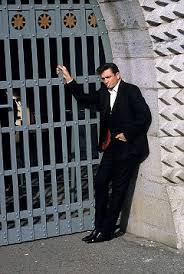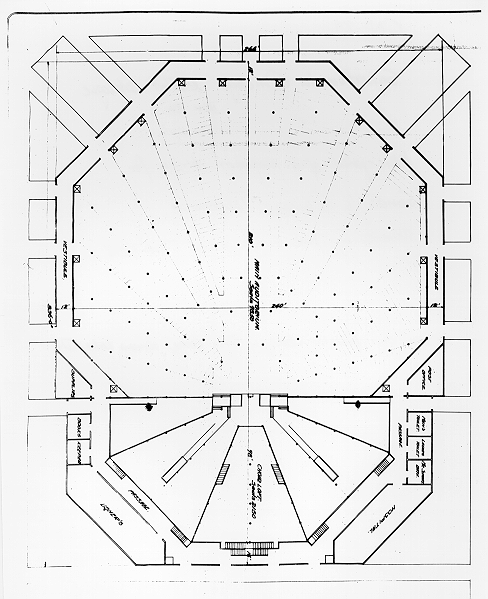
The great American prophet Johnny Cash really hit this one on the head: Flesh and blood needs flesh and blood.
Obviously borrowing from Adam's pre-Eve bachelorhood, Cash's little ditty is about a guy looking all around him for a companion, but unable to find one until he lights upon his true love. The song culminates into a very cool, unique-to-Johnny line at the beginning of the main chorus:
Mother nature's quite a lady,
but you're the one I need.
Flesh and blood need flesh and blood,
and you're the one I need.
Creation, as beautiful as it is is, can never satisfy like a friend, companion or lover can. And this points us to a deeper reality.
Over the past few days, we've gone over the story of a God who dwells with His people. So far, we've only gotten as far as wood and canvas, however, as we've focused primarily on God's instructions for Israel to build Him a Tabernacle in the Wilderness, "so that I may dwell with them."
As great as this immeasurable, certainly undeserved grace is--that God would in any sense dwell with His people--it would never be completely beautiful or satisfying, and it would never demonstrate both the justice and mercy of God, if it were confined only to acacia and canvas.
For God's love to truly be poured into our hearts--for God to truly dwell with man--His presence must become "realer" than wood and canvas.
Flesh and blood needs flesh and blood.
One key piece of evidence to support this statement is to look at the entirety of Israel's history throughout the Old Testament. The rise and fall, obedience and--most often--disobedience of God's people point to their need for a deeper cleansing, a fuller revelation of God, a final and fuller dwelling of God with man.
And hope is scattered throughout the Old Testament, right alongside disappointment and disillusionment more times than not. But in very few places is hope expressed more clearly than in Isaiah 7, which we will soon hear throughout the Christmas season, as Advent grows closer and closer.
Amid severely hopeless prophecy about the up-coming demise and capture of Israel by invading armies, the Lord speaks to King Ahaz, who had recently taken the reigns from his father, King Uzziah. The Lord commands poor, terrified Ahaz to ask him for a sign from the Lord, "deep as Sheol or high as heaven."
When Ahaz declines, most likely from fear and even mistrust, the Lord gives him a sign anyways--the sign of Immanuel, "God with us."
Behold, the virgin shall conceive and bear a son,
and shall call his name Immanuel.
Speaking just a chapter later to Isaiah, the Lord further tells of this One who is to come, this "God with us" against whom the enemies of Israel and the Lord will not stand:
For to us a child is born,
to us a son is given;
and the government shall be upon his shoulder,
and his name shall be called
Wonderful Counselor, Mighty God,
Everlasting Father, Prince of Peace.
Of the increase of his government and of peace,
there will be no end,
on the throne of David and over his kingdom,
to establish and uphold it
with justice and with righteousness
from this time forth and forevermore.
The zeal of the Lord of Hosts will do this.
In this One, God will dwell among men in a way previously unimaginable. This "child", this "son" will also be called "Mighty God" and "Everlasting Father", along with other names that pertain only to the Lord.
Upon Him, this God-with-us, the Lord of Hosts will lay the government even of the great king, David. That is, the One to take up the everlasting throne of David as the right ruler of God's people is Himself God-with-us.
What an amazing thing must it have been for Mary--the virgin who conceived--to hear these words echoed and applied to her yet-to-be-born Son in Luke 1: "And the Lord God will give him the throne of his father David, and he will reign over the house of Jacob forever, and of his kingdom there will be no end."
And what an amazing thing it must have been for righteous Joseph to hear in a dream that--far from a failed engagement ending in a shameful annulment--his pregnant fiance would bear the one called Jesus, who would "save his people from their sins."
This pregnancy was not to lead to shame, but to the ushering in of Immanuel, "God with us."
Finally, what a shockingly clear statement John makes in his opening prologue, 1:14 in particular:
And the Word (Jesus) became flesh and dwelt (literally: tabernacled) among us...
To quote a Christmas carol before it's proper to do so (it being early November and all), Do you See What I See? In Jesus, the God of the universe, the Lord of Hosts, whose loving presence and kindly kingship we have spurned, has finally and fully come to "dwell among men."
God spanned the distance that we proved unable to do at Babel. He didn't require for us to go up, He has come down.
The Word taken on flesh means that God got his hands dirty. In Jesus, the Creator of all that is literally became what He had formed out of dirt.
In the Wilderness Tabernacle, God came and met with man in a tent made of canvas, but in Jesus, the true and better Tabernacle, God came and met with man in man, as man.
That is good news indeed.
But the great news is, that taking on flesh and dwelling among us wasn't the furthest extent to which God has gone to again be with man. He went still further.
Flesh and blood needs flesh and blood. Not just to live for us, but to die for us.












